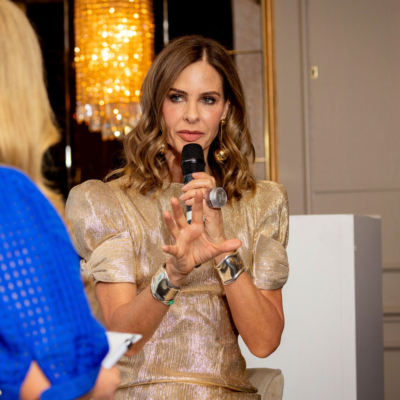#LetsTalkFertility – ReproMed have Launched their Fertility Awareness Campaign with ambassador Terrie McEvoy …
Ireland’s leading IVF provider, ReproMed, has just launched an awareness campaign aimed at women in their 20s and early 30s. The #LetsTalkFertility campaign seeks to educate and empower women and afford them the opportunities to take their fertility health and reproductive future into their own hands.
The campaign, fronted by ReproMed Campaign Ambassador, nurse and social media personality Terrie McEvoy, seeks to change people’s perception of reproductive health and enable women to take control of their future personal fertility path by embracing the conversation now around understanding their own fertility and reproductive cycles.
“I have a number of really close friends, who over the course of the last few years, have had struggles and challenges with fertility. Speaking with them really opened my eyes and encouraged me to think about my own fertility. As their friend I wanted to support them and as a medical professional I realised that I wanted more knowledge of the area, so that I was better equipped to understand such a personal experience,” said Terrie. “I am so grateful for my own friend’s willingness to share their experiences and in turn, advise me, as without them I don’t think I would have given my own fertility much thought. Having been working with ReproMed behind the scenes now for a number of months, I feel much more knowledgeable and empowered.”
A particular discussion that most women will have at some stage in their lives (whether they are in a heterosexual or same sex relationship or are single) is whether to have a baby or not and although you may spend your 20s and early 30s trying not to conceive, this is actually the optimum time for your ovaries and overall fertility health.

ReproMed Campaign Ambassador, Terrie McEvoy
What you should know about your fertility in your 20s and 30s
Planning a family might be the very last thing on your mind right now but you’ve probably thought about your own fertility at some stage. If babies are in your future, albeit a long way off, experts insist that it’s really important to be aware of your reproductive health, aka what’s going on in your ovaries, from periods to hormonal changes.
Lifestyle factors or choices you make in your twenties, as well as any genetic issues, could have an impact on your fertility in later life. Smoking, excess drinking, over-exercise or a high BMI can all affect fertility.
It’s also good to remember that the quality and number of eggs a woman has usually declines quite rapidly after 35. We are born with a finite number of eggs that deplete as we age. However, every woman is different and will have a personal fertility timeline that could be earlier or later depending on health, medical and family history.
Although you can’t increase your egg numbers, you can work to preserve egg quality – even if you have fewer eggs, you can still have good ones!
When to seek help?
If you’re experiencing missed or irregular periods, very painful periods or anything you may be worried about, don’t ignore them and go to your fertility clinic and get tested, if nothing more than to have peace of mind. Undergoing an early fertility screening could also identify a lot of possible triggers for future fertility issues including PCOS and endometriosis. The results of your fertility screening may then prompt you to further investigate other options open to you including egg freezing.
If you are at the stage of actively trying for a baby but having some delay, it can be difficult to know when to visit a specialist to seek possible treatment. This can often depend on the individual but one of the most important factors in determining when is right to get support, is age. If you’re under 35 and trying for a year with no success, seek help, if you are between 35-39 and trying for six months with no success, seek help and if you are over 40, don’t delay, seek help immediately.

Egg freezing – what is it and what’s involved?
Egg freezing is one of the fastest growing fertility treatments and success rates are improving all the time. ReproMed clinics across Ireland have witnessed a 42% increase in patients requesting egg freezing services pointing to an increased awareness of fertility options amongst women and a desire to take more control of their reproductive health.
Egg freezing involves the collection of a number of eggs from a woman’s ovaries which are then frozen for potential use in the future for the purposes of having a baby. The process involves some basic fertility tests followed by stimulation of the patients’ ovaries using hormone injections over an 8-12 day period to promote growth of the eggs. When using the eggs in the future, they are thawed in the laboratory and inseminated using sperm from a partner or donor.
It is well known that a woman’s fertility decreases from the age of 35 as a result of diminishing egg numbers and poorer egg quality. For women wishing to preserve their fertility and freeze eggs, it offers a route whereby if you do not wish to start your family now, but think you might in future, you can preserve your current fertility and give yourself a higher chance at success when you are ready.

Dr Hans Arce, Medical Director ReproMed
Campaign ambassador Terrie says that “By taking the time to think and talk about your fertility and considering the options that are available, you are allowing yourself to be in control of your future. Taking part in this campaign allows me to use my platform to open up this important conversation with so many more women and I am truly empowered about that.”
Commenting on the campaign, Dr Hans Arce, Medical Director ReproMed says: “The aim of this campaign is to encourage women to think about their fertility and the steps they can take now to ensure they optimise their fertility health in the future. It can be a challenging subject to discuss which is why we need to have open and honest conversations with friends and family around fertility to normalise the conversation and make sure anyone interested in accessing fertility services whether that is AMH testing or IVF, can do so feeling fully supported at every stage.”
The invisible weight of the baby deadline no longer holds as much control with the many options available to women these days and with life, work, relationships, friends and family there’s already a lot going on! Get involved in the conversation #LetsTalkFertility and take control of your fertility journey.
LOVETHEGLOSS.IE?
Sign up to our MAILING LIST now for a roundup of the latest fashion, beauty, interiors and entertaining news from THE GLOSS MAGAZINE’s daily dispatches.









